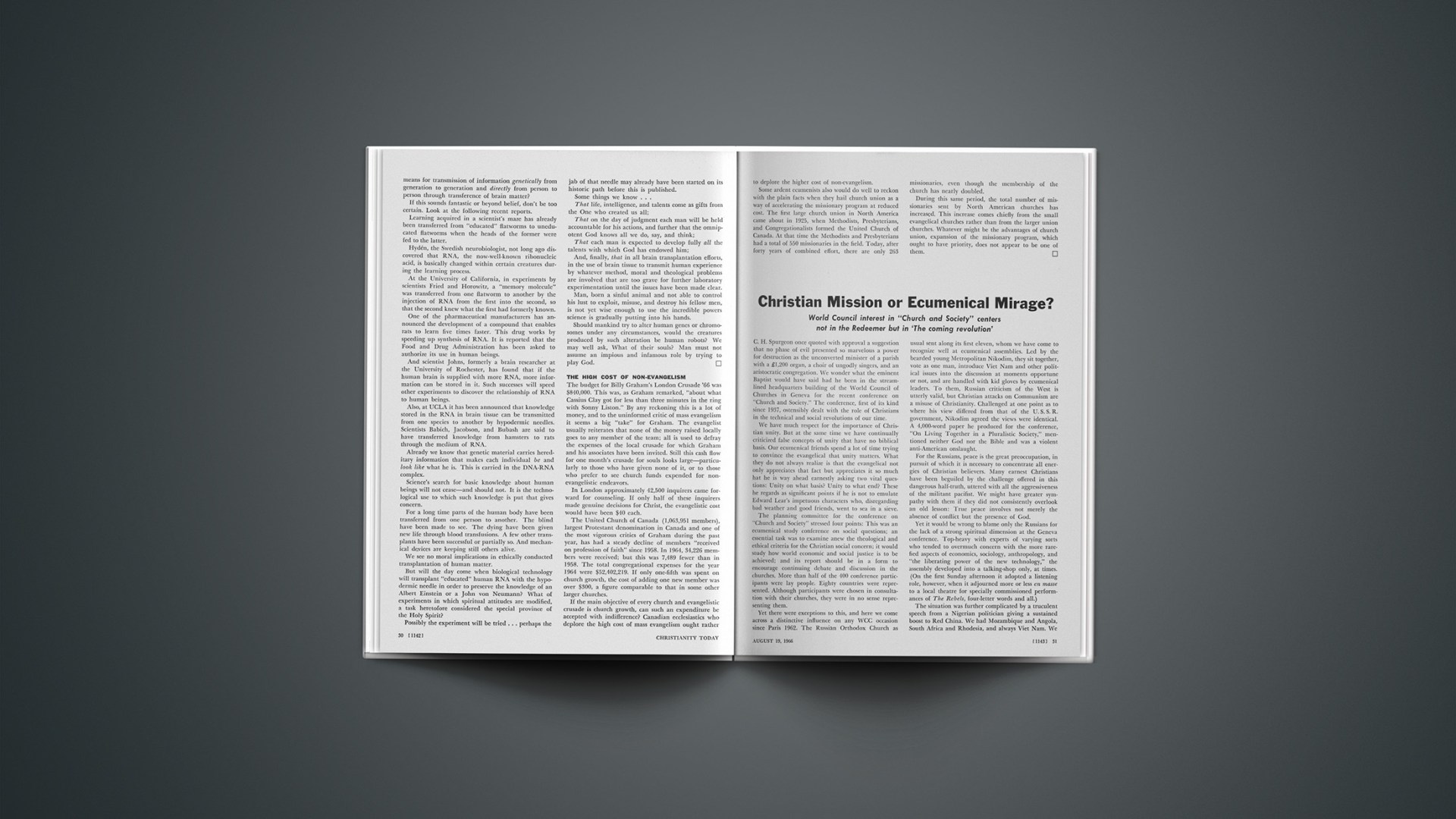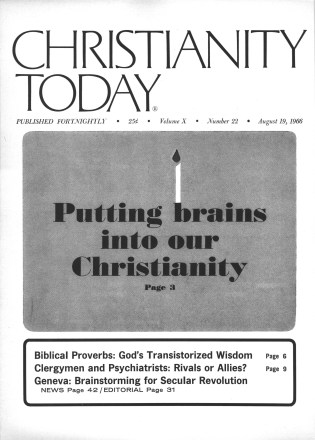World Council interest in “Church and Society” centers not in the Redeemer but in ‘The coming revolution’
C. H. Spurgeon once quoted with approval a suggestion that no phase of evil presented so marvelous a power for destruction as the unconverted minister of a parish with a £ 1,200 organ, a choir of ungodly singers, and an aristocratic congregation. We wonder what the eminent Baptist would have said had he been in the streamlined headquarters building of the World Council of Churches in Geneva for the recent conference on “Church and Society.” The conference, first of its kind since 1937, ostensibly dealt with the role of Christians in the technical and social revolutions of our time.
We have much respect for the importance of Christian unity. But at the same time we have continually criticized false concepts of unity that have no biblical basis. Our ecumenical friends spend a lot of time trying to convince the evangelical that unity matters. What they do not always realize is that the evangelical not only appreciates that fact but appreciates it so much hat he is way ahead earnestly asking two vital questions: Unity on what basis? Unity to what end? These he regards as significant points if he is not to emulate Edward Lear’s impetuous characters who, disregarding bad weather and good friends, went to sea in a sieve.
The planning committee for the conference on “Church and Society” stressed four points: This was an ecumenical study conference on social questions; an essential task was to examine anew the theological and ethical criteria for the Christian social concern; it would study how world economic and social justice is to be achieved; and its report should be in a form to encourage continuing debate and discussion in the churches. More than half of the 400 conference participants were lay people. Eighty countries were represented. Although participants were chosen in consultation with their churches, they were in no sense representing them.
Yet there were exceptions to this, and here we come across a distinctive influence on any WCC occasion since Paris 1962. The Russian Orthodox Church as usual sent along its first eleven, whom we have come to recognize well at ecumenical assemblies. Led by the bearded young Metropolitan Nikodim, they sit together, vote as one man, introduce Viet Nam and other political issues into the discussion at moments opportune or not, and are handled with kid gloves by ecumenical leaders. To them, Russian criticism of the West is utterly valid, but Christian attacks on Communism are a misuse of Christianity. Challenged at one point as to where his view differed from that of the U. S. S. R. government, Nikodim agreed the views were identical. A 4,000-word paper he produced for the conference, “On Living Together in a Pluralistic Society,” mentioned neither God nor the Bible and was a violent anti-American onslaught.
For the Russians, peace is the great preoccupation, in pursuit of which it is necessary to concentrate all energies of Christian believers. Many earnest Christians have been beguiled by the challenge offered in this dangerous half-truth, uttered with all the aggressiveness of the militant pacifist. We might have greater sympathy with them if they did not consistently overlook an old lesson: True peace involves not merely the absence of conflict but the presence of God.
Yet it would be wrong to blame only the Russians for the lack of a strong spiritual dimension at the Geneva conference. Top-heavy with experts of varying sorts who tended to overmuch concern with the more rarefied aspects of economics, sociology, anthropology, and “the liberating power of the new technology,” the assembly developed into a talking-shop only, at times. (On the first Sunday afternoon it adopted a listening role, however, when it adjourned more or less en masse to a local theatre for specially commissioned performances of The Rebels, four-letter words and all.)
The situation was further complicated by a truculent speech from a Nigerian politician giving a sustained boost to Red China. We had Mozambique and Angola, South Africa and Rhodesia, and always Viet Nam. We had the bones of colonialism rattled by young Africans whose fathers suffered cruelly under apartheid, yet whose “I-am-as-good-as-you-are” never seems to be balanced with “you-are-as-good-as-I-am.” There were maddeningly imprecise references to the coming revolution.
After ten days of it, an old bishop from the Balkans stood up, walked slowly to the microphone, and said simply and sadly: “The name of our Lord Jesus Christ has been hardly mentioned.” It was a true word to a conference in which had been selected the tacit view of a transcendental God whose interests in his creation left a lot to be desired, and whose administration had to be supplemented by men specially equipped for the task. A Rumanian priest from Paris tried to put things into proper perspective by reminding those present: “God is not in danger and the Church is not in danger. These are not for us to protect. Their roots are in heaven, not earth; it is on heaven that they are dependent, not on man.” This was received, incredibly, with laughter.
It was difficult throughout to see just where many of the speakers would consider the preaching of Christ to come into all this. When we have helped the under-developed countries to develop, helped right their wrongs, filled their barns, fought their diseases, educated their children—then is it permissible to tell them in whose name it was all done, and to preach to them Christ Jesus and him crucified? Might not the time come when they will remember with a start of surprise, and no little resentment, that here is not just a social gospel but a spiritual Gospel too, that Jesus Christ came not just to feed the hungry but to save guilty sinners? It is not enough to give God a respectful nod in rushing past to do his work; if we tarried with him a little longer he would tell us how best to do it. And isn’t preaching the Gospel also part of the Church’s task in society? When we recall John Calvin, it seems ironic though pertinent to see an ever-widening gulf fixed between Geneva and Jerusalem.
Five years ago CHRISTIANITY TODAY interviewed Dr. Charles Malik of Lebanon, former president of the United Nations General Assembly. Asked how the Christian remnant could recover an apostolic initiative in witnessing to the world, he discounted “mechanical techniques which call for a special conference at six in the morning and another at eleven.” He pointed out that Jesus did not concern himself mainly with how to organize, however important that may be. Mass organization “without the inclusion of the Holy Spirit, with all its grace and freedom and power,” would be useless.
The most important thing, Dr. Malik insisted, was “ardent prayer for the Holy Spirit to come mightily into the hearts of men.” (Such stress on prayer we find noticeably absent in WCC conclaves.) “Economics and politics are certainly realities,” Dr. Malik went on, “but not the primary realities with which the Church has to deal. The Church can examine these things in the light of the Holy Ghost and with the mind of Christ. But primarily the Church ought to be above politics and economics, ought to feel that it can thrive even in hell. If it is going to wait until the economic and social order is perfect before it can tell you and me individually that right here and now we can be saved, no matter which this politico-economic order is, it will never accomplish its proper work. Think of Jesus Christ saying to us: ‘You’ve got first to perfect your government, to perfect your social system, to perfect your economic system, before you take your cross and follow me.’ He would never say that.”
While denying that there was any such antithesis, Archbishop William Temple said clearly: “If we have to choose between making men Christian and making the social order more Christian, we must choose the former.” In an age when people are no longer asking “Is Christianity true?” but rather “What is Christianity,” all of us might profitably remember the biblical injunction to seek first the Kingdom of God. Then, and only then, will we have the vital principle on which depends the Christian’s role in our times.
A Glimpse Into The Abyss
Few crimes have shocked America more profoundly than the murder of the eight student nurses in Chicago. But the nationwide shudder at this senseless slaughter had barely passed when Charles J. Whitman massacred fifteen people in Austin, Texas. And again a society that has become all too accustomed to brutality and violence (see News, p. 49) stands appalled.
Once in a while, as in these cases, man’s deeds give a shattering insight into the truth of that darkly realistic word of the Lord to Jeremiah, “The heart is deceitful above all things, and desperately wicked [RV, “desperately sick”]: who can know it?” Sometimes the lid is lifted, and there is a glimpse into the abyss.
Yet it is not only crimes like these, or the assassination of President Kennedy, or the Nazi snuffing-out of six million Jews, or the murder of millions under the Stalinist regime, or the grim consequences of modern war, that evidence the deadly disease to which the human heart is subject. The callous unconcern for human suffering and lack of neighbor love that mark many a respectable citizen also reveal man’s capacity for evil.
How desperately men everywhere need to learn that for the malady that afflicts the natural heart there is only one sovereign cure—the redeeming work of Christ. Yet the availability of this cure does not absolve society from responsibility. Must guns be indiscriminately accessible without check of the purchaser’s character or sanity? Does the national tendency to violence and lawlessness breed these horrors? Is inflation of essential news coverage of crime into morbid sensationalism either necessary or desirable? And along with questions like these, one is haunted by the poignant thought of what might have been if Lee Harvey Oswald, or the killer of the eight nurses, or Charles J. Whitman, had been given treatment and shown Christian instruction and compassion when they most needed a healing touch.










